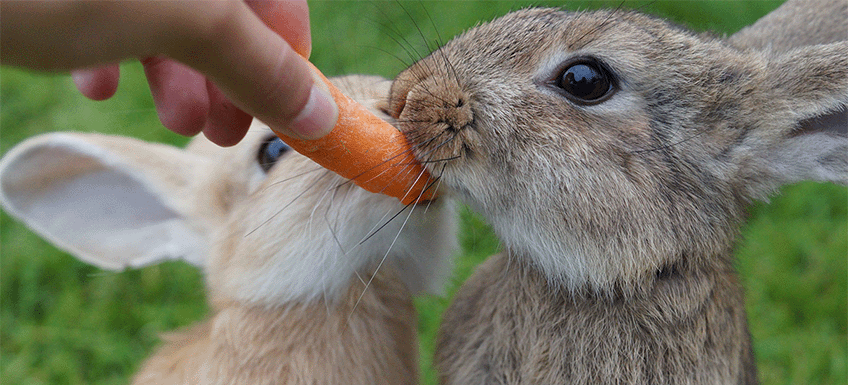
Feeding Your Pet Rabbit: Tips for a Balanced and Healthy Diet
Small Animals
Diet and Nutrition
15/05/2023
Wild rabbits are herbivores that eat a grass- and plant-based diet, and what you feed your pet rabbit should mimic this as much as possible. This means offering plenty of fresh hay, vegetables and water, supplemented with high-fibre pellets and the occasional treat.
Hay, hay, hay
Pet rabbits should have access to an unlimited supply of fresh, good-quality hay. Containing high levels of fibre, hay is essential for your bunny’s digestive health and prevents the formation of hairballs.
Rabbits also like to graze, and nibbling hay reduces boredom by keeping them occupied for long periods. What’s more, rabbits’ teeth grow continuously throughout their lives, and eating hay helps wear them down evenly. Store the hay in a dry place and put it in a rack to keep it separate from hay used for bedding.
You should also feed your rabbit fresh grass and weeds, however, you need to be completely sure they haven’t been sprayed with chemicals or soiled by dogs. For this reason, you should never feed your bunny lawn clippings or grass from roadside areas.
What fruit & vegetables should you feed your rabbit?
There’s a good reason why vegetables are known as ‘rabbit food’ – they’re great for bunnies because they’re rich in fibre, vitamins and minerals, and are low in calories.
Feed your rabbit at least three different types of vegetable each day in a variety of colours, including:
- Leafy greens (such as romaine lettuce and bok choy)
- Broccoli leaves
- Green capsicum
- Brussels sprouts
- Celery leaves
- Parsnips
- Carrots and carrot tops
- Dandelion greens
- Parsley
The white parts of iceberg lettuce can cause diarrhoea, so only feed very limited amounts of the green leaves to your rabbit.
While vegetables are an integral part of a pet rabbit’s diet, fruit should be regarded as a treat and fed only in small quantities i.e. no more than one or two tablespoons a day. Fruit has a high sugar content that can contribute to tooth decay, weight gain and digestive upsets if fed in excess.
Suitable fruits for rabbits include:
- Pears
- Apples
- Kiwifruit
- Melons
- Peaches
- Pineapple
- Strawberries
Consider growing organic fruit and veges for your rabbit (and yourselves!) at home. This is a great way to educate kids about gardening and responsible pet ownership at the same time. You could grow the food in a specific area of the garden and then place a playpen over it and let your rabbit graze to its heart’s content. Canterberries offer pre-packed mixes of plant seeds that are great for rabbits, from grasses such as lucerne to herbs like coriander and basil.
Whether homegrown or store-bought, ensure all fruit and vegetables are fresh, and wash and dry them thoroughly to remove pesticides. If they remain uneaten after 24 hours, remove them from the hutch.
Buying off the shelf food
Commercially prepared foods are quick and easy to feed, but they should always be given in combination with fresh hay and vegetables. Choose pellets and extruded foods that are nutritionally balanced and contain at least 20% fibre.
Rabbit mixes are also available – just ensure that your bunny isn’t only eating their favourite items in the mix, leaving behind the healthy, fibrous parts. As they’re often highly concentrated, these foods are suitable for young rabbits that are still growing, but should be limited in quantity once your pet reaches maturity.
Chew on these!
Most rabbit-owners are well aware that bunnies love to chew – especially if their slippers have fallen prey to their pet’s chompers! Chewing is a natural instinct for rabbits as it wears down their ever-growing teeth, preventing their molars from developing painful spikes. It’s important to provide safe, edible materials for your bunny to gnaw on.
Apart from offering fresh hay, you could also give your rabbit cardboard toilet rolls, untreated willow baskets, dried pinecones or apple-tree branches to chew. But don’t give them cherry, peach, apricot or plum branches, as these are toxic. Gnawing blocks and other chew toys are also available from pet stores.
Good options for treat time
Rabbits are very social animals so feeding them the occasional treat is a great way to establish a close bond with your pet. Treats are also useful if you want to train your rabbit.
Apart from a small amount of fresh fruit, you can give your rabbit treats such as:
- Treat sticks made of nuts and dried fruit (available from pet shops)
- Plain biscuits
- Potato chips
- Popcorn
These are all fine, just as long as they're given in very limited quantities. It’s very important not to give too many treats or your rabbit may become overweight.
Why is my rabbit eating it's droppings?
There’s no need to be concerned if you notice your rabbit eating its own droppings. It is normal for these animals to eat moist, mucous-coated droppings called ‘cecotropes’ from their rear ends at night. The cecotropes are rich in nutrients and fibre and need to be re-ingested in order for the goodness to be absorbed properly.
Keeping your rabbit hydrated
Ensure that a generous supply of fresh water is available to your rabbit around the clock. If possible, use bottles with a metal spout rather than bowls to prevent contamination of the water. Change your rabbit’s water daily, and wash the bottle thoroughly at least once a week to prevent a build-up of bacteria.
Finding the perfect feeding routine
It’s a good idea to establish a regular routine by feeding your rabbit at the same times each day. Make sure the food has warmed to room temperature if its been in the fridge, and put it in a sturdy bowl that can’t be tipped over easily. Rabbits can be fussy eaters and have sensitive digestive systems, so introduce new foods gradually and one at a time.
By taking the time to consider your rabbit’s nutritional needs and feeding the appropriate foods, your rabbit will be hip, hop, happy!

Written by The Pet.co.nz
Team
Written by The Pet.co.nz Team
A team of specialists with backgrounds in animal nursing, animal care, and all things pet related.